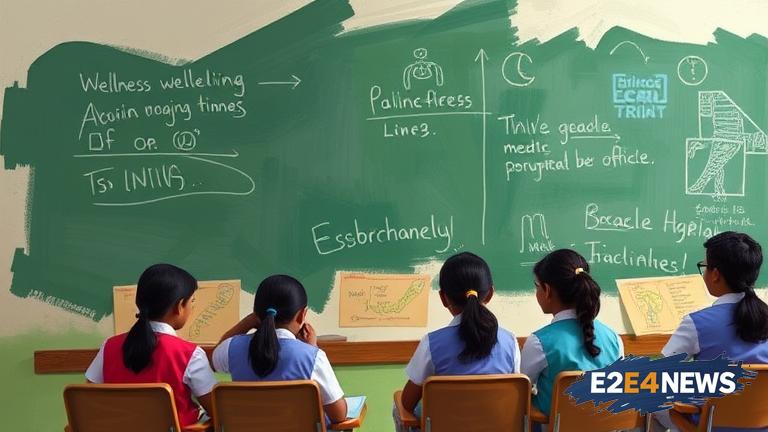The Central Board of Secondary Education (CBSE), National Council of Educational Research and Training (NCERT), and the United Nations Educational, Scientific and Cultural Organization (UNESCO) have collaborated to expand wellness programmes in Indian schools. This initiative aims to promote student mental health and well-being, recognizing the importance of holistic education. The programme will be implemented in various schools across the country, with a focus on creating a supportive environment for students to thrive. The CBSE has been working towards integrating wellness programmes into the school curriculum, and this partnership with UNESCO and NCERT will further enhance these efforts. The programme will include activities such as yoga, meditation, and mindfulness, designed to reduce stress and anxiety among students. Additionally, it will provide training for teachers to identify and address mental health issues in students. The NCERT will develop educational materials and resources to support the programme, while UNESCO will provide technical assistance and expertise. The collaboration is expected to benefit millions of students across India, promoting a culture of wellness and inclusivity in schools. The programme will also focus on developing life skills, such as emotional intelligence, empathy, and self-awareness, essential for students’ overall development. Furthermore, it will encourage student participation in extracurricular activities, sports, and community service, fostering a sense of social responsibility and teamwork. The initiative has been welcomed by educators and experts, who believe that it will have a positive impact on student well-being and academic performance. The programme is also expected to help reduce the stigma associated with mental health issues, encouraging students to seek help when needed. The CBSE, NCERT, and UNESCO are committed to ensuring the programme’s success, with plans to monitor and evaluate its effectiveness regularly. The collaboration is a significant step towards prioritizing student mental health and well-being in Indian schools, recognizing the critical role education plays in shaping young minds. The programme’s expansion is expected to be phased, with initial implementation in select schools, followed by a nationwide rollout. The CBSE, NCERT, and UNESCO will work closely with state governments, schools, and other stakeholders to ensure the programme’s successful implementation. The initiative is also expected to promote community engagement, with parents and local communities encouraged to participate in wellness activities and support the programme. Overall, the collaboration between the CBSE, NCERT, and UNESCO is a significant development in Indian education, highlighting the importance of student mental health and well-being. The programme’s success will depend on the active participation of all stakeholders, including students, teachers, parents, and the wider community. With its focus on holistic education and student well-being, the initiative has the potential to make a lasting impact on Indian education, shaping the minds of future generations. The programme’s emphasis on life skills, emotional intelligence, and social responsibility will also contribute to creating a more compassionate and inclusive society. As the programme expands, it is expected to serve as a model for other countries, demonstrating the importance of prioritizing student mental health and well-being in education. The CBSE, NCERT, and UNESCO are committed to making the programme a success, recognizing the critical role it plays in promoting student well-being and academic excellence.
